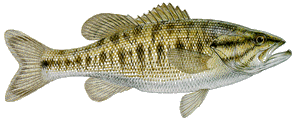Guadalupe Bass (Micropterus treculii)
- Other Names
- Black Bass, Guadalupe Spotted Bass
- Description
- Game fish - see statewide bag & size limits and lake-specific exceptions
Micropterus is Greek, meaning "small fin" and is a rather unfortunate misnomer arising from an injured type specimen that made it appear that the posterior rays of the soft dorsal fin formed a small separate fin. Treculi refers to Trecul, the French compatriot of Vaillant and Bocourt. Trecul actually caught the specimen. The Guadalupe bass is generally green in color and may be distinguished from similar species found in Texas in that it doesn't have vertical bars like smallmouth bass, its jaw doesn't extend beyond the eyes as in largemouth bass, and coloration extends much lower on the body than in spotted bass. - Life History
Guadalupe bass do not grow to large size because they are adapted to small streams. However, a propensity for fast flowing water, and their ability to utilize fast water to their advantage when hooked, make them a desirable sport fish species. Their preference for small streams enhances their allure to anglers because of the natural setting where small streams are usually found. Specimens in excess of 3.5 pounds have been landed.
Both males and females become sexually mature when they are one year old. Guadalupe bass spawning begins as early as March and continues through May and June. A secondary spawn is possible in late summer or early fall. Like all other black bass, Guadalupe bass build gravel nests for spawning, preferably in shallow water. As with spotted bass and smallmouth bass, males tend to build nests in areas with higher flow rates than largemouth bass. When a male has successfully attracted a female to the nest she may lay 400 to over 9,000 eggs. The female is then chased away and the male stands guard over the incubating eggs. After hatching, fry feed on invertebrates and switch to piscivory as they grow older. Very young fish and older adults tend to include more invertebrates in their diet than do largemouth bass. Juveniles and younger adults tend to include more fish in their diets than do largemouth bass.
- Habitat
- Typically, Guadalupe bass are found in flowing water, whereas largemouth bass are found in quiet water.
- Distribution
- The Guadalupe bass is found only in Texas and has been named the official state fish. It is endemic to the northern and eastern Edwards Plateau including headwaters of the San Antonio River, the Guadalupe River above Gonzales, the Colorado River north of Austin, and portions of the Brazos River drainage. Relatively small populations can also be found outside of the Edwards Plateau, primarily in the lower Colorado River. Introduced populations exist in the Nueces River system.
- Other
- The Guadalupe bass, like other "black bass" including largemouth, smallmouth, and spotted bass, is not a true bass at all but a member of the sunfish family Centrarchidae.
